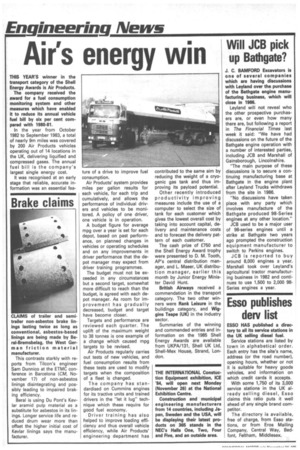Air's energy win
Page 16

If you've noticed an error in this article please click here to report it so we can fix it.
THIS YEAR'S winner in the transport category of the Shell Energy Awards is Air Products.
The company received the award for a fuel consumption monitoring system and other measures which have enabled it to reduce its annual vehicle fuel bill by six per cent compared with 1980-81.
In the year from October 1982 to September 1983, a total of nearly 9m miles was covered by 200 Air Products vehicles operating out of 14 locations in the UK, delivering liquified and compressed gases. The annual fuel bill is the company's largest single energy cost.
It was recognised at an early stage that reliable, accurate information was an essential fea ture of a drive to improve fuel consumption.
Air Products' system provides miles per gallon results for each vehicle, for each trip and cumulatively, and allows the performance of individual drivers and vehicles to be monitored. A policy of one driver, one vehicle is in operation.
A budget figure for average mpg over a year is set for each depot, based on past performance, on planned changes in vehicles or operating schedules and on any improvements in driver performance that the depot manager may expect from driver training programmes.
The budget must not be exceeded in any circumstances but a second target, somewhat more difficult to reach than the budget, is agreed with each depot manager. As room for improvement has gradually decreased, budget and target have become closer.
Targets and performance are reviewed each quarter. The uplift of the maximum weight to 38 tonnes is one example of a change which caused mpg targets to be revised.
Air Products regularly carries out tests of new vehicles, and fuel consumption results from these tests are used to modify targets when the composition of a fleet is changed.
The company has standardised on Cummins engines for its tractive units and trained drivers in the "let it lug" technique which these require for good fuel economy.
Driver training has also helped to improve loading efficiency and thus overall vehicle efficiency, while Air Products' engineering department has contributed to the same aim by reducing the weight of a cryogenic gas tank and thus improving its payload potential.
Other recently introduced productivity improving measures include the use of a computer to select the size of tank for each customer which gives the lowest overall cost by taking into account capital, delivery and maintenance costs and to forecast the delivery pattern of each customer.
The cash prize of £750 and the Shell Energy Award trophy were presented to D. M. Tooth, AP's central distribution manager, and L. Maeer, UK distribution manager, earlier this month by Junior Energy Minister David Hunt.
British Airways received a commendation in the transport category. The two other winners were Rank Leisure in the buildings category, and Wiggins Teape (UK) in the industry sector.
Summaries of the winning and commended entries and information on the 1985 Shell Energy Awards are available from UKPA/131, Shell UK Ltd, Shell-Mex House, Strand, London.
































































































